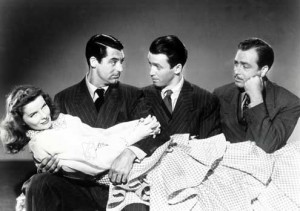hollywood flashbacks: katharine hepburn’s charms and the philadelphia story
Katharine Hepburn is the greatest. Let’s just get that out of the way to begin with. Entertaining on and off screen, she is one of the first people I think of in relation to the words ‘film’ and ‘feminist icon’. Smart, snarky and independent, her publicists worried that her image might seem too masculine for the general public, and tried to get her to tone it down, but she continued wearing trousers around town and doing whatever she wanted. Including publicly having an affair with a married man for over 20 years (whatever your views on the morality of the situation, that would have taken guts in the 1940s and 50s).
The Philadelphia Story is one of the most purely enjoyable films made in Hollywood’s ‘golden age’. Hepburn stars with a youthful Cary Grant and Jimmy Stewart in a tale that’s ostensibly about a wedding but is mostly about people drinking too much champagne and being ridiculous, and all the men falling for Katharine Hepburn.
Tracy Lord (Hepburn) is about to be married to her second husband George (John Howard), a bland sort of person who hardly appears in the film after the first ten minutes. “To hardly know him is to know him well,” Cary Grant’s character quips. The day before the wedding, who should turn up but Tracy’s first husband, C.K. Dexter Haven (Grant) with whom she parted on less than amicable terms. He comes back telling her he’s changed, has stopped drinking, and wants her back, basically. (Alarm bells anyone? Maybe, but it’s Cary Grant in 1940, let’s be realistic here.) Haven isn’t being entirely honest with anyone, though – he’s asked a journalist and photographer (Stewart and Ruth Hussey) from the imaginatively-named tabloid Spy Magazine to cover the wedding in secret, to ‘expose’ the Lord family and their extravagant, upper-class ways. He gets them onto the guest list by saying they’re friends of his.
The film is partly about Haven’s attempts to win Tracy back, which (spoilers) he does, and which everyone knows will happen from the beginning. It’s also about the attraction between Tracy and journalist Mike Connor (Jimmy Stewart), a disillusioned dreamer who hasn’t quite figured out his life yet, and falls for Tracy almost against his will – he doesn’t want to be attracted to a rich heiress type like her. “You’ve got all the arrogance of your class, haven’t you?” he says, just before he tries to kiss her. The best scene of the film, hands down, is the one where Mike has a little or a lot, too much champagne at the pre-wedding party. Tracy drinks because she’s confused about whether to go ahead with the whole thing, he drinks for the hell of it, and they end up dancing drunkenly by the lake in the moonlight. (That’s not a euphemism, although maybe it could be.) Then, in one of Jimmy Stewart’s most entertaining scenes ever, Mike takes a taxi over to Haven’s place, still cradling his bottle of champagne, to tell him he’s a terrible person. (Quote: “Champagne is a great levelleler. It makes you my equal.”) He addresses him throughout the scene as ‘C.K Dexter Haven’ in full, and is just an adorable drunk, and maybe you have to watch the scene to see why it’s so hilarious, but it really is. Grant and Stewart are trying not to crack up the whole time, especially as some of the dialogue and the hiccupping is improvised.
But back to Hepburn. Is the film problematic from a modern feminist viewpoint? There are a couple of scenes that don’t read well – Haven and Tracy’s father both accuse her of being a cold, unfeeling ‘goddess’, and she has to become more ‘womanly’ before she can get back together with Haven. The strength of Hepburn’s screen persona, though, as well as her intelligence, more than make up for these moments. Ruth Hussey’s character is also interesting, smart, and has some great lines in her short time on screen (eg. “I can’t afford to hate anybody. I’m only a photographer”).
Watch The Philadelphia Story for the chemistry between the actors, to see Hepburn in one of her most fun roles, for the dialogue and the way it still manages to be insightful about relationships. The film comes down to a statement of Tracy’s: “The time to make up your mind about people is never.”
Image Credit (1)


